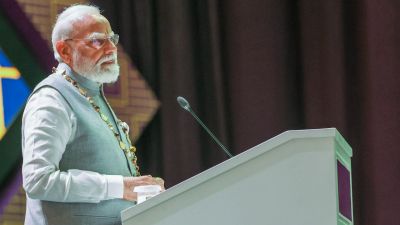Pakistan times
Developments in Pakistan since the assassination of Benazir Bhutto have been most extensively...

Developments in Pakistan since the assassination of Benazir Bhutto have been most extensively reported in the Urdu press. Delhi-based Hindustan Express on December 31 writes in an editorial, 8220;Bibi zinda hain Bibi is alive8230; The remaining Bhuttos and her political heirs have once again given proof of their wisdom which was demonstrated by Benazir after the hanging of her father, Zulfiqar Ali Bhutto8230; it is easy to take revenge by 8216;blood for blood8217;, but it is very difficult to defeat the enemy by following a path of peace and non-violence.8221;
Rashtriya Sahara December 30 has been inspired to use a couplet as the headline on a page 1 signed editorial by Aziz Burney 8220;Yeh baazi khoon ki baazi hai, yeh baazi tum hi haaroge, har ghar se Bhutto niklega, tum kitne Bhutto maaroge. This has blood at stake, and you will be the loser. Each home will produce a Bhutto, how many will you kill?8221; Obliquely holding Musharraf and the US responsible for the assassination, the editorial Bush aur Mush ki Jodi 8212; the Bush and Musharraf twosome mockingly asks that 8220;if Al Qaeda were to pick one Pakistani to kill if it is angry with the US and Mr Bush, is it difficult to understand who that would be?8221;
Jamaat-e-Islami8217;s bi-weekly Daawat on January 1 has taken a different line. 8220;Pro-US elements are hiding behind the name of jihadi groups and indulging in the character assassination of Islam.8221; Interestingly, it has approvingly quoted the Pakistani journalist Aroosa Alam in the news in India for different reasons to the effect that the persons named by Benazir after the attack on her in Karachi included Pakistan8217;s IB chief, the CMs of Punjab and Sind and five other important persons.
Taking a dim view of democracy in Pakistan, Mumbai, Delhi, Dehradun and Lucknow based Sahafat on December 29 says, 8220;it has been proved beyond doubt after Benazir8217;s assassination that it is not possible to usher in democracy there.8221; It adds, 8220;perhaps the most important reason is that the temperament of the majority of the Pakistani people is not democratic.8221;
Gujarat results
Narendra Modi8217;s second successive win in the state elections has not produced any rancour but a sense of dejection in most papers.
Hyderabad daily, Rahnuma-e-Deccan, is one such example. It says, 8220;the contest in Gujarat was between 8216;bad8217; and 8216;worse8217; and Gujarat8217;s voters have given their decision8230; at the start of the campaign, a CD on Gujarat riots was brought to light to create sympathy for Modi and create an opportunity to raise the slogan of Hindutva. It gave an opening to Modi to speak in mixed metaphors 8212; semi-communalism and semi-development8230;8221; The paper says, 8220;the use of Maut ka Saudagar helped fire the election campaign.8221;
On December 28 in an editorial, Daawat surprisingly absolves Narendra Modi. It writes that the Congress had never dreamt of winning Gujarat, as there was no unity nor any homework done by them. It writes, 8220;Modi did not use negative Hindutva and anti-Muslim sentiments as a basis of his election campaign. It can be said that this time, BJP did not fight the election in the name of Hindutva, and did not make use of fascist and anti-minority slogans that could have raised passions8230;8221; The paper terms Modi8217;s 8220;consistent struggle and planning8221; as 8220;wise and farsighted8221;.
Hyderabad-based Munsif on December 24 writes it would be 8220;premature to say if the voters of Gujarat were affected by the communal propaganda of Modi. The truth is, during the elections, there was no Gujarati leader of the Congress to match forces with Modi.8221;
Lucknow8217;s Qaumi Khabrein on December 24 writes in an editorial, 8220;it will not be uninteresting to know how much benefit Mayawati has accrued to Modi by putting up candidates on a large number of seats8230; the responsibility of protecting the secular spirit of the constitution drafted by Babasaheb Ambedkar is as much of the BSP, as of the Congress or other secular parties.8221;
Orissa burning
Akhbaar e Mashriq has expressed concern at the burning of churches in Orissa. On December 28 it writes, 8220;in a paradise like India, whether attacks are on Christians or on Muslims, the loss has to be borne by the entire country.8221;
Delhi8217;s Jadeed Khabar on December 28 has called for 8220;action8221; and 8220;intervention by the Centre8221;. It says 8220;the Centre must instruct the Patnaik government for immediate action, failing which, it should be dismissed and presidential rule must be enforced.8221;
Benazir8217;s nine
Rashtriya Sahara January 1 has a story on how Benazir has been haunted by the number nine. Her birth date and month, the day she died or got married to Asif Zardari all added to nine. The year she was asked to quit politics was 1998 1998 and she was 54 54 when she died. The paper says there is an email doing the rounds on the eerie 8216;nine8217; factor in Benazir8217;s life.
Compiled by Anees Chishti, senior journalist and editor of 8216;Alpjan Quarterly8217;
- 01
- 02
- 03
- 04
- 05































